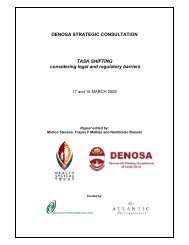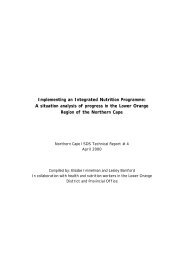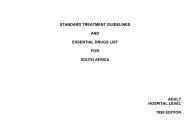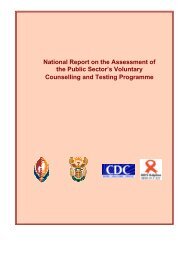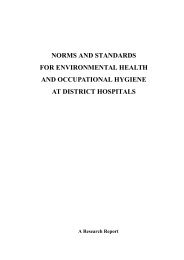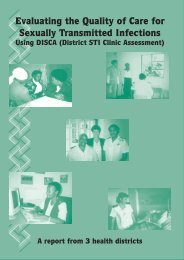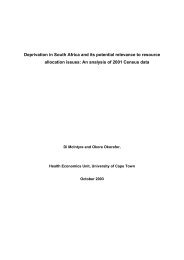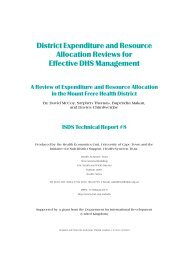SAHR 2007 - Health Systems Trust
SAHR 2007 - Health Systems Trust
SAHR 2007 - Health Systems Trust
Create successful ePaper yourself
Turn your PDF publications into a flip-book with our unique Google optimized e-Paper software.
<strong>Health</strong> Information <strong>Systems</strong> in the Private <strong>Health</strong> Sector 6<br />
In terms of legislation and regulation, health care providers in<br />
both the public and private sectors are required to report on<br />
notifiable diseases. However, the extent to which this occurs<br />
is not clear. For public and private sector hospitals, there is<br />
an agreed data set which should be reported monthly. 24<br />
The development and implementation of a national electronic<br />
health record for South Africa (eHR.ZA) could provide<br />
an important and effective mechanism for integration of<br />
data for patient care across the public and private health<br />
care sectors. With the necessary attention to confidentiality<br />
requirements, such combined data have the potential to be<br />
used for reporting and planning for health services at provincial<br />
and national levels across the entire health care sector.<br />
The tender for the eHR.ZA indicated that this would be a<br />
national record, rather than being restricted to the public<br />
sector. 25 However, as this tender has not yet been awarded,<br />
it is doubtful that it will actually be implemented.<br />
Confidentiality of personal health<br />
information<br />
Overview of legislation<br />
There are various pieces of legislation which have direct<br />
bearing on the protection of personal health information.<br />
They place a responsibility on all role players in the public<br />
and private health care environment to ensure that confidentiality<br />
of personal health information is maintained at all<br />
times. In terms of section 14 of the Constitution, every person<br />
has the right to privacy, which includes the right to have his<br />
or her information kept confidential.<br />
In line with the Constitution, the National <strong>Health</strong> Act places<br />
an obligation on health care providers or establishments<br />
to protect health records and emphasises confidentiality of<br />
information and informed consent for disclosure of information<br />
for public health purposes. The process of development<br />
of Regulations to support this provision of the National <strong>Health</strong><br />
Act will commence soon. Section 57 of the Medical Schemes<br />
Act places obligation on the board of trustees of medical<br />
schemes to take reasonable steps to protect beneficiary<br />
information. This extends to all contracting arrangements<br />
including managed care organisations, administrators and<br />
data transmission companies.<br />
In addition to these legislative provisions, health care<br />
providers are also obliged under the respective legislative<br />
provisions and ethical rules of their regulatory authorities<br />
to ensure anonymity of personal health information and<br />
to obtain informed consent for disclosure of confidential<br />
information.<br />
Other legislative provisions that have a bearing on personal<br />
health information are the Electronic Communications Act<br />
(Act 36 of 2005) and the Promotion of Access to Information<br />
Act (Act 54 of 2002), which emphasises the protection of<br />
personal information and the need for informed consent for<br />
the disclosure of information. 26,27<br />
Informed consent<br />
When beneficiaries consult with health care providers, prior<br />
to treatment, the provider is required to secure informed<br />
consent from the patient. In addition, regulatory authorities<br />
such as the HPCSA, require health care providers to secure<br />
informed consent to transmit information to medical schemes<br />
and for referral purposes to health care providers in the<br />
continuum of care.<br />
Privacy<br />
Privacy in the health care environment refers to the refusal by<br />
a consumer to allow a health care provider to either disclose<br />
or transmit information to any other party not directly involved<br />
in the health care delivery process.<br />
When beneficiaries join a medical scheme, they enter into a<br />
contract with the scheme and when health care services are<br />
accessed the scheme reimburses the health care provider<br />
in terms of a predetermined basket of services. However,<br />
beneficiaries and their dependants may refuse to have part<br />
or all of their personal health information submitted to their<br />
medical scheme. This impacts on the medical schemes’ ability<br />
to accurately assign benefits for services rendered and to<br />
reimburse the provider. This action is inconsistent with legislative<br />
provisions of the Medical Schemes Act, which stipulates<br />
the minimum set of information required for honouring a<br />
claim from a health care provider.<br />
Confidentiality<br />
Confidentiality is protected where an individual / patient<br />
agrees to have personal health information disclosed only<br />
to authorised personnel for the execution of specific functions<br />
or responsibilities. In the private health sector environment,<br />
this entails the submission of a claim by a health care<br />
provider to a medical scheme for purposes of accessing<br />
member benefits and requesting reimbursement for services<br />
99







